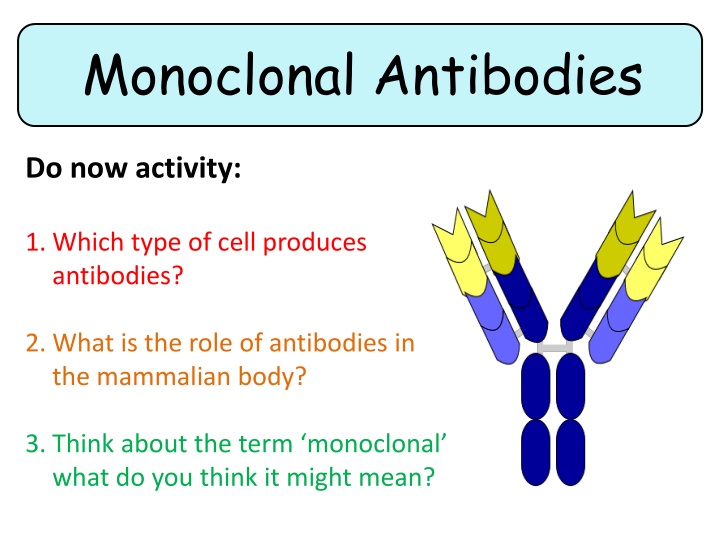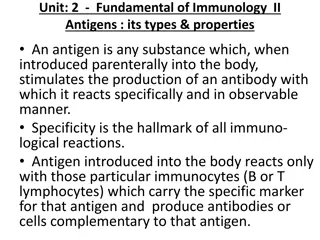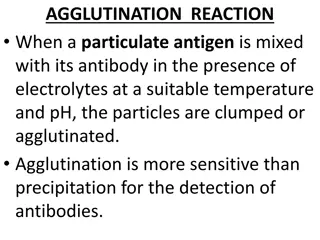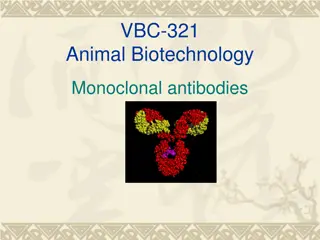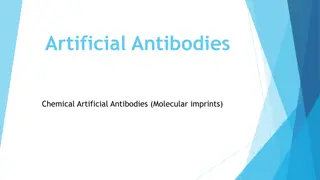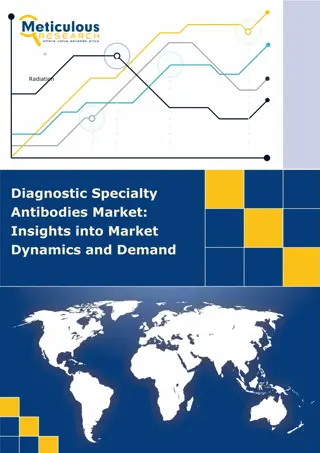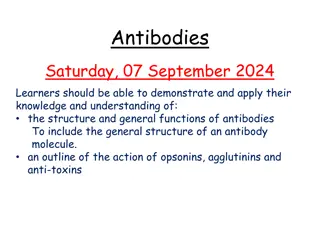Monoclonal Antibodies in Medical Treatment
Monoclonal antibodies are created using hybridoma cells that can produce specific antibodies and divide rapidly. These antibodies, which target specific antigens, have various applications in medicine, such as in cancer treatment and pregnancy tests. By harnessing the immune system's abilities, monoclonal antibodies are versatile tools for diagnosis and therapy.
Download Presentation

Please find below an Image/Link to download the presentation.
The content on the website is provided AS IS for your information and personal use only. It may not be sold, licensed, or shared on other websites without obtaining consent from the author.If you encounter any issues during the download, it is possible that the publisher has removed the file from their server.
You are allowed to download the files provided on this website for personal or commercial use, subject to the condition that they are used lawfully. All files are the property of their respective owners.
The content on the website is provided AS IS for your information and personal use only. It may not be sold, licensed, or shared on other websites without obtaining consent from the author.
E N D
Presentation Transcript
Monoclonal Antibodies Do now activity: 1. Which type of cell produces antibodies? 2. What is the role of antibodies in the mammalian body? 3. Think about the term monoclonal what do you think it might mean?
Progress indicators GOOD PROGRESS: Describe how monoclonal antibodies are used Describe some of the uses of monoclonal antibodies OUTSTANDING PROGRESS: Evaluate the advantages and disadvantages of using monoclonal antibodies
Monoclonal antibodies are a type of treatment which relies on the immune system. Some white blood cells, known as lymphocytes, make antibodies but cannot divide. Tumour cells do not usually make antibodies but divide rapidly to make a clone of cells. Using both of these cells monoclonal antibodies are made: B Lymphocytes make specific antibodies but do not divide. These are harvested from mice. A hybridoma cell (makes specific antibodies and divides) These hybridoma cells are cloned The hybridoma cells produce the monoclonal antibodies. Which are separated, purified and then used Tumour cells that do not make antibodies but do divide.
Task: Fill in the diagram below using the following statements: Hybridoma cells are cloned Mice lymphocytes and tumour cells are combined to make a special type of cell called a hybridoma. This special type of cell can produce specific antibodies and divide rapidly. B lymphocytes make specific antibodies but are unable to divide. These are harvested from mice. Monoclonal antibodies are separates, purified and can then be used Tumour cells that do not make antibodies but are able to divide.
Self-assessment: B Lymphocytes make specific antibodies but do not divide. These are harvested from mice. Mice lymphocytes and tumour cells are combined to make hybridoma cells. These cells can make specific antibodies and divide rapidly. These hybridoma cells are cloned The hybridoma cells produce the monoclonal antibodies. Which are separated, purified and then used. Tumour cells that do not make antibodies but do divide.
Using monoclonal antibodies An antigen is a protein molecule which are often found on the surface of cells. Although they can also be free molecules. Because monoclonal antibodies only target and bind to one specific type of antigen, they can be used in a number of different ways.
Pregnancy tests https://www.youtube.com/watch?v=aOfWTscU8YM One very important use of monoclonal antibodies is in pregnancy tests. Watch the video and answer the following questions: 1. Describe the test Egyptian women would take to find out if they were pregnant 2. Over the counter pregnancy tests detect which hormone? 3. What is the role of HCG during pregnancy? 4. What happens at the reaction zone ? 5. What happens at the test zone ? 6. What happens at the control zone ?
Self-assessment: 1. Urinate on wheat and barley seeds, if either started to grow then the woman was pregnant! 2. Pregnancy tests detect the hormone - HCG 3. HCG is firstly needed to stop the lining of the uterus from breaking down. It is also needed throughout pregnancy to support the development of the placenta. 4. Antibodies grab on to HCG. Attached to these antibodies are enzymes (AB1 )which have the ability to turn on dye molecules, which will be needed later on. 5. In the test zone are more antibodies which also stick to HCG on one of it s five binding sites. The enzyme carried by the antibody can now join with the dye molecule to cause a visible pattern. 6. As the urine passes through the strip excess AB1 enzymes reach the control zone and bind with dye molecules to produce a second line. If the second line doesn t appear, it is because the test is faulty.
Task: You are going to use the information around the room to complete the following table: Use of monoclonal antibodies Explain how monoclonal antibodies are used in this method Pregnancy Test Diagnosis of disease Measuring/monitoring Research Treating cancer
Task: You will be given a mixture of cards, you will need to sort them into advantages and disadvantages of monoclonal antibodies: Advantages Disadvantages They only bind to specific diseased or damaged cells that need treatment. They do no affect healthy cells. Monoclonal antibody treatment initially caused side effects. As mouse antibodies were used, this caused an immune reaction when used in humans Specificity of monoclonal antibodies means they can be used to treat a range of conditions. At the moment the development of monoclonal antibodies is quite expensive Producing the right monoclonal antibodies and attaching them to drugs or other compounds proved more difficult than expected. In the future is hoped that the use of monoclonal antibodies will be a cheaper procedure, cheaper than developing conventional drugs. As it will be tried and tested technology.
Plenary: Choose two of the following questions to answer: 1. What does the term clone mean? 2. Define a monoclonal antibody 3. Describe a hybridoma cell. 4. Explain the need for hybridoma cells in the production of monoclonal antobodies
Describe the test Egyptian women would take to find Describe the test Egyptian women would take to find Over the counter pregnancy tests detect which Over the counter pregnancy tests detect which What is the role of HCG during pregnancy? What is the role of HCG during pregnancy? What happens at the reaction zone ? What happens at the reaction zone ? What happens at the control zone ? What happens at the control zone ? What happens at the test zone ? What happens at the test zone ? out if they were pregnant out if they were pregnant hormone? hormone? 2. 3. 4. 5. 6. 2. 3. 4. 5. 6. 1. 1.
Diagnosis of disease Monoclonal antibodies can be made to bind to antigens found on the surface of pathogens, or on blood clots or on cancer cells. Monoclonal antibodies may also have markers attached to them which makes it easier for doctors to see where they have built up. This allows doctors to detect problems before they start to seriously affect a person s health. An example is the blood test for prostate cancer. Blood is taken from the patient, monoclonal antibodies are added to the blood which bind to prostate-specific antigens if present.
Measuring and monitoring Monoclonal antibodies can also be used by hospitals and laboratories to detect the levels of various chemicals in the blood. This includes levels of hormones. For example, screening donates blood for HIV infection, detecting drugs which have been illegally used by athletes and detecting infections such as syphilis.
Research Research scientists use monoclonal antibodies to locate or identify specific molecules in a cell or a tissue. Scientists will produce monoclonal antibodies which are linked to a specific molecule or fluorescent dye. For example, green fluorescent protein. When the monoclonal antibodies bind to the desired molecule, scientists can see what has happened by observing the build-up of fluorescence.
Treating cancer Many types of cancer are still not easy to treat. Scientists are working to develop treatments using different monoclonal antibodies that will target specific cancers. Currently there are three methods of using monoclonal antibodies to treat cancer: Direct use of monoclonal antibodies to trigger the immune system to recognise, attach and destroy cancer cells Using monoclonal antibodies to block receptors on the surface of cancer cells, which stops them growing and dividing Monoclonal antibodies can be used to carry toxic drugs or radioactive substances for radiation therapy. They can also carry chemicals that stops cells growing and dividing, these latch on cancer cells directly without harming other cells in the body.
They only bind to specific diseased or damaged cells that need treatment. They do no affect healthy cells. They only bind to specific diseased or damaged cells that need treatment. They do no affect healthy cells. Monoclonal antibody treatment initially caused side effects. As mouse antibodies were used, this caused an immune reaction when used in humans Monoclonal antibody treatment initially caused side effects. As mouse antibodies were used, this caused an immune reaction when used in humans At the moment the development of monoclonal antibodies is quite expensive At the moment the development of monoclonal antibodies is quite expensive Specificity of monoclonal antibodies means they can be used to treat a range of conditions. Specificity of monoclonal antibodies means they can be used to treat a range of conditions. Producing the right monoclonal antibodies and attaching them to drugs or other compounds proved more difficult than expected. Producing the right monoclonal antibodies and attaching them to drugs or other compounds proved more difficult than expected. In the future is hoped that the use of monoclonal antibodies will be a cheaper procedure, cheaper than developing conventional drugs. As it will be tried and tested technology. In the future is hoped that the use of monoclonal antibodies will be a cheaper procedure, cheaper than developing conventional drugs. As it will be tried and tested technology.
